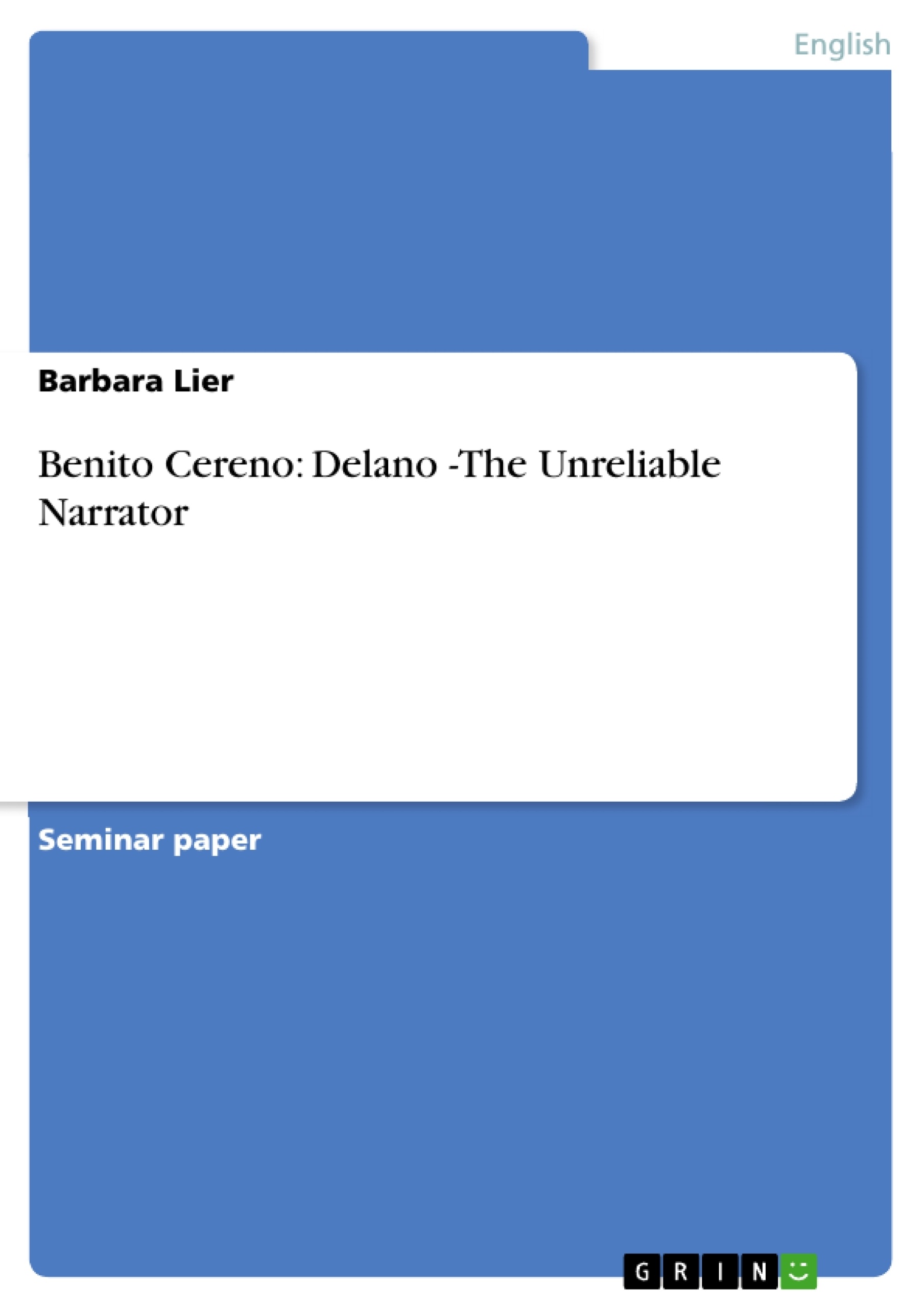Excerpt
CONTENTS
1, Introduction
2, Part One – Delano's Character
3, Part Two – "Double Narrative"- The Seeing/Unseeing Delano
4, Part Three – The Gordian Knot
5, Conclusion
6, List of Literature
INTRODUCTION
"Benito Cereno" has been certified by one learned commentator as one of Herman Melville's "most superb achievements"[1], and it would seem that this judgement is well made. Simultaneously an exercise in ensnaring the reader in a tangled web of intrigue and a biting satire on the all too prevelant "passive" (and even "benign") racism of his time, the author uses one character above all others in this narrative to achieve his ends: the skipper of the "Bachelor's Delight," Captain Amasa Delano. The story is, for the most part, narrated via Captain Delano, and, although the question of "multi-perspective narrative," as one commentator has termed it, could pose one or two interesting problems, it seems reasonable to assume here that much - if not all - of the association of events in the story and the plentiful imagery and reference to symbolic figures occurs in Delano's own mind. Indeed, excluding – obviously – Benito Cereno's own deposition, Delano's is the only clear-cut point of view the reader is offered, and thus it would seem difficult to argue that we can see any more than the American Captain; although, crucially, we are able to "notice" more than he does. In other words, we are compelled to see through Delano's eyes, though we need not necessarily agree with the associational processes of his mind.
Furthermore, it is often the case that, throughout the story, we find ourselves at odds with the American's conjectures – we do not travel with him during his occasional journies into the depths of paranoia, nor do we share his frequently blithe optimism. In short, even before the true state of affairs is made clear to us in the denouement, we do not trust Delano's view of events aboard the "San Dominick."
The questions we must deal with here are, quite simply, why and how this mistrust is evoked in us; (it is testament to Melville's skill that the denouement is a true denouement; that we are able to discern a real "wrongness" in the situation described to us, but that we find it extremely difficult to fathom the nature of this "wrongness"). What is it that leads us to believe that things are certainly not as they seem, and, more interestingly, that they are not as they seem to Captain Delano?
To answer this question, it is necessary firstly to examine what we know of Delano's character, and secondly, to look at that which is narrated "via" the American, and which causes some level of suspicion – a level not likely to be easily dismissed - in our minds, although not, it seems, causing any lasting impression in his. Finally, in a story rich in symbolism, we must attempt to "unravel" the most provacative symbol of all: the "Gordian Knot" that Delano is incapable of cutting. After an analysis of these three themes, it should be possible to explain why and how Captain Amasa Delano can justifiably be described as an "unreliable narrator."
PART ONE – DELANO'S CHARACTER
It is important to recognise that Delano is not an uneducated man. As mentioned above, we can assume that the associations between the "real" appearance of the characters and circumstances, and the imagery used to describe them takes place in Delano's own mind. With this in mind, it is the American that sees that the San Dominick's "keel seemed laid, her ribs put together, and she is launched from Ezekiel's Valley of Dry Bones"[2] ; it is Delano who asks himself whether "the Spaniard [was] less hardened than the Jew, who refrained not from supping at the board of him whom the same night he meant to betray"[3]. Likewise, he makes the connection between the light of the "screened sun", and a (somewhat distorted) recollection of the "mild light from Abraham's tent"[4].
Quite apart from at least a basic knowledge of the Bible, Delano has, it seems, read (or certainly heard of) the writings of the traveller and explorer John Ledyard[5] ; he is familiar with the legends concerning Alexander the Great[6] ; notwithstanding the fact that the entirity (excepting the one utterance made by the "aged sailor" in "broken English"[7]) of the dialogue conducted by Delano aboard the San Dominick takes place, we are told, in Spanish, which is not the American's native tongue. Moreover, the Captain sees a connection between a razor wielded by Babo and a "sword drawn before James the First of England"[8], signifying some insight into British history. It is also possible, perhaps, that the reference to "second childhood" during Delano's self-chastising for his suspicions[9] is to Shakespeare's "Seven Stages of Man", although this, of course, is unclear and largely speculative.
[...]
[1] Browne, Ray B., "Melville's Drive to Humanism," Page 152
[2] "Benito Cereno," Page 2226; See Ezekiel 37.1.
[3] Ibid., Page 2263; the reference is clearly to Judas Iscariot.
[4] Ibid., Page 2263; See Genesis 18.1.
[5] Ibid., See Page 2245, ff.
[6] Ibid., See Page 2247, ff.
[7] Ibid., Page 2247 - 2248
[8] Ibid., Page 2255
[9] Ibid., See Page 2248
- Quote paper
- Barbara Lier (Author), 1998, Benito Cereno: Delano -The Unreliable Narrator, Munich, GRIN Verlag, https://www.grin.com/document/3040
Publish now - it's free





















Comments